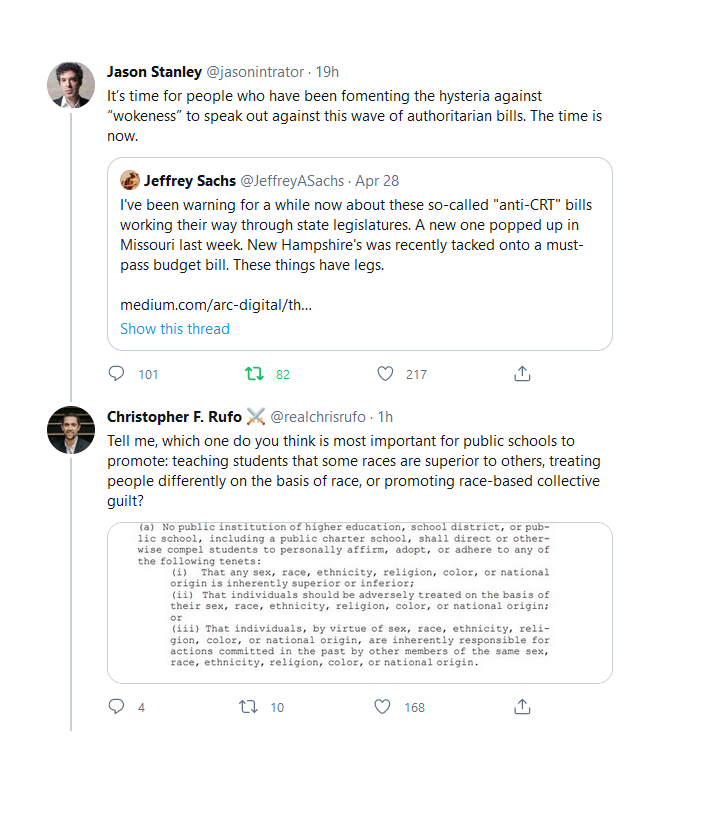
I would be curious to hear what my fellow #AcademicFreedom researchers think of the details in this recent Canadian story at @RyersonU. (HT @ColleenDerkatch) 1/
theeyeopener.com/2021/05/ryerso…
theeyeopener.com/2021/05/ryerso…
The gist of it:
1. "In 2016, the Suzanne Rogers Fashion Institute (SRFI) opened with a $1 million donation from The Edward and Suzanne Rogers Foundation. . . . In past, the Rogers family has donated almost $34 million to various programs at Ryerson."
2/
1. "In 2016, the Suzanne Rogers Fashion Institute (SRFI) opened with a $1 million donation from The Edward and Suzanne Rogers Foundation. . . . In past, the Rogers family has donated almost $34 million to various programs at Ryerson."
2/
2. "On May 1, 2021, Suzanne Rogers, honorary patron of the Suzanne Rogers Fashion Institute, posted a photo of herself and her family with former U.S. president Donald Trump at Mar-a-Lago, as reported by Canadaland."
3/
3/
3. Given that photo's publicity, the social media accounts of the Ryerson School of Fashion posted this statement. I highlight: "We invite Suzanne Rogers to enter into dialogue with our faculty, staff and students to discuss the impact that Trump and his community has had."
4/
4/

5. There's a disclaimer beside the above post. It reads: "THE FOLLOWING STATEMENT WAS WRITTEN BY RYERSON UNIVERSITY @ryerson_u IN RESPONSE TO THE PREVIOUS POST MADE BY THE SCHOOL OF FASHION."
6/
6/
6. "Chair of fashion Ben Barry posted the statement in a thread on his personal Twitter account, where he had also posted and deleted the previous statement. His final tweet in the thread reads: 'These are @RyersonU words not mine.'"
7/
7/
7. "In an emailed statement to The Eye, Ryerson said the fashion department did not consult with the university on the statement, and sharing it on official School of Fashion social media accounts falsely suggested that the message was approved and endorsed by Ryerson."
8/
8/
8. Further on that email affirms faculty #AcademicFreedom to criticize the university and wider society and claims: "They can and should do so; however, if they decide to use institutional channels, such as school social media accounts, proper procedures must be followed."
9/
9/

I'm curious about the intersection here between department social media accounts as, on the one hand, expressions of faculty governance (what is posted in consultation between faculty members and dept leadership), and, on the other hand, as official institutional channel. 10/
Are there universities where what is posted on dept social media is sent for approval to higher admin first? My experience is, departments decide for themselves. What is posted is an expression of the work in the department--the teaching, the scholarship, the organizing. 11/
If a dept social media account posts stuff that runs afoul of the work that some of its faculty members do or that doesn't express a dept/school consensus, there will be internal back-and-forth about that. (E.g., one of my units retweeting a Jordan Peterson event. 😉) 12/
I can grant that the leadership of Ryerson, which is in close contact with the Rogers family given their ongoing million-dollar donations, will talk to the department head about the post. How can they not. But to demand its deletion and replacement with the above message? 13/
So, one of my questions is: In the context of faculty governance, academic freedom, and the institutional structure of the university, what are department social media accounts? How much can higher administration offices control them? 14/
My other question is about accountability to those who hold your name. Rogers paid to have her name put on the Ryerson fashion school. That creates a relationship. Not just with the donors' office that managed this deal, but with the faculty and students at the school. 15/
The faculty and students at the fashion school carry her name in their daily work. Students carry her name wherever they take their degrees after they graduate. She has done something, in public, that goes against their school's values. They invite her into a dialogue. 16/
Why should they not do that? 17/
What this looks like:
The school's leadership, faculty, students, say: "What you did in public is against our values. Suzanne Rogers, we are open to talk about this with you."
The uni admin says: "We will shut down these public attempts to initiate conversation."
18/
The school's leadership, faculty, students, say: "What you did in public is against our values. Suzanne Rogers, we are open to talk about this with you."
The uni admin says: "We will shut down these public attempts to initiate conversation."
18/
Or, that time when a university's official statement about remaining "curious about perspectives we do not yet know" becomes a reprimand against being too open and too curious.
19/
19/
@threadreaderapp unroll
For uni administrations, two strong suggestions I have that arise from this story's details.
➡️One: Do not make up "proper procedures" out of thin air where hitherto there were none, in an ad hoc fashion so as to enable you simply to assert control.
20/
➡️One: Do not make up "proper procedures" out of thin air where hitherto there were none, in an ad hoc fashion so as to enable you simply to assert control.
20/
https://twitter.com/Katja_Thieme/status/1389285696783884288?s=20
➡️Two: As university administration, you should not make demands about what members of your university put on their personal Twitter accounts.
21/
21/
https://twitter.com/Katja_Thieme/status/1389285693155790850?s=20
PS: Suzanne Rogers issued a response. I wrote a thread about it.
https://twitter.com/Katja_Thieme/status/1389679441094213632?s=20
• • •
Missing some Tweet in this thread? You can try to
force a refresh







